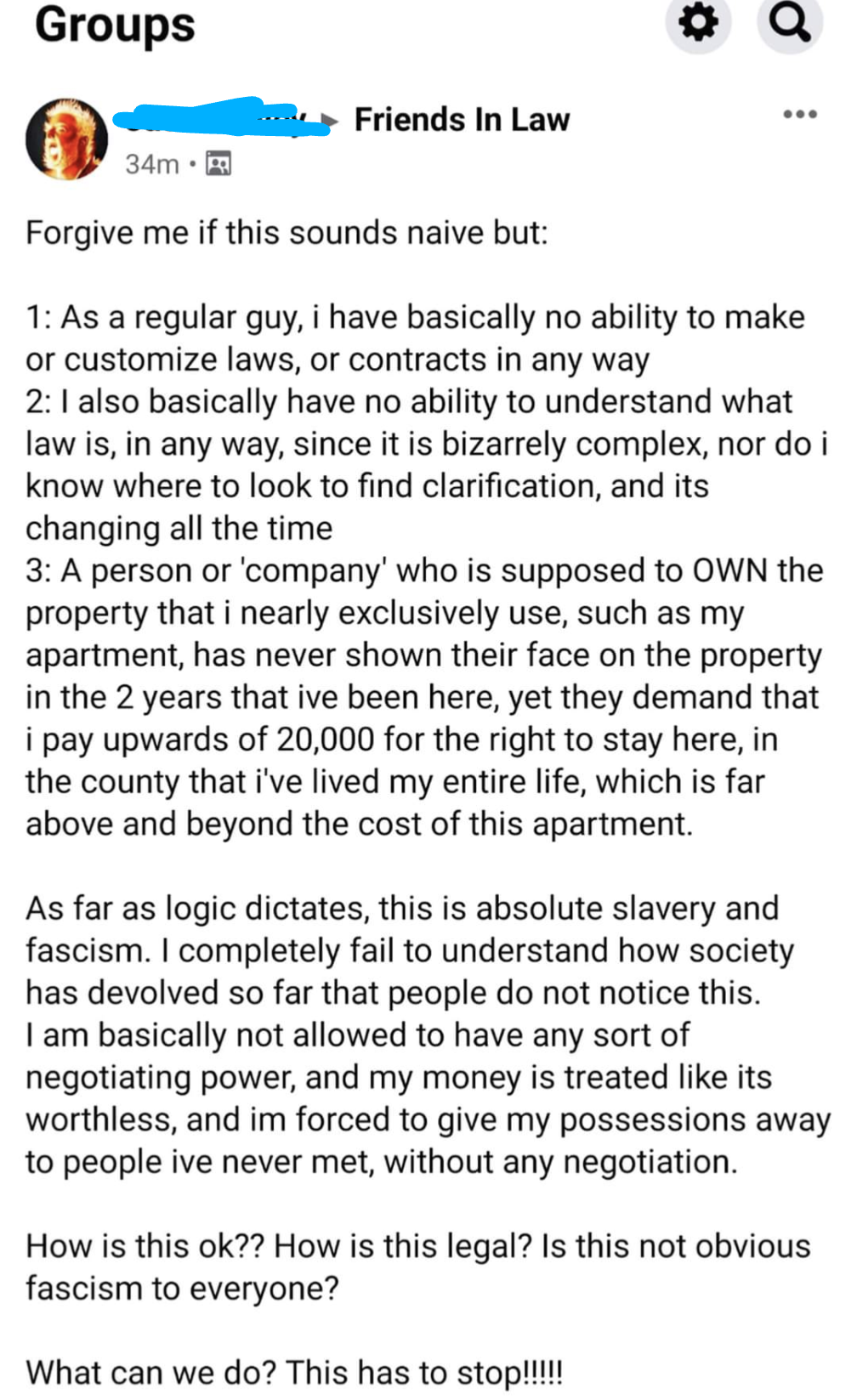this post was submitted on 04 Feb 2024
188 points (93.9% liked)
InsanePeopleFacebook
3727 readers
62 users here now
Screenshots of people being insane on Facebook. Please censor names/pics of end users in screenshots. Please follow the rules of lemmy.world
founded 2 years ago
MODERATORS
you are viewing a single comment's thread
view the rest of the comments
view the rest of the comments

I think you're a little bit confused about why large companies sometimes are able to continue to receive services from their vendors if there is a lapse in payment.
It isn't because they have legal standing, or are entitled to them, it's just that their vendors are weighing the balance of probability: is it more likely that they'll collapse and never get paid due to creditor protection... Or will they sort their shit out and pay late (as opposed to never). If they cut the supply of whatever the service is, that will damage the business relationship and it's likely they'll lose their contracts all together.
And yeah, sometimes companies use this as a bullying tactic.
But... There isn't really any ambiguity in the civil law here: if you agree to pay for goods and services, and stop, then you aren't entitled to those goods and services anymore.
I think you’ve fundamentally misunderstood entitlement here. Squatter’s rights, for example, are an immediate counter to your lack of ambiguity. The securities system is built around not paying for things to get things, as are most subsidies. There’s a way to do all of that correctly, which most sovcits don’t understand.
You should go onto a sovcit forum and explain that yes, they can get things for free and that they're just all doing it wrong.
By your own telling, you can get things for free if you’re large enough or have enough capital. Sounds like you’re right there with me!
No, I would be telling the sovcits that just because their services aren't immediately cut off after a failure to pay, does not mean that they don't eventually have to pay, and that if they don't pay, their creditors will at the very least suspend the services, and almost certainly seek to collect the debt. Because that's how it actually works. Both for individuals or corporations.
There sure are a lot of buildings, a lot trades, a bunch of water, and, best example, a few sovereign nations on US soil that would disagree with you.
I get that you think the rule of law matters. It doesn’t when you can afford the right lawyers or the right politicians. Sovcits are still crazy. It’s okay.
I'm not debating whether or not people get fucked in deals, or if parties ever stop paying for things.
When it's an ongoing agreement, like a phone bill, a credit card, or rent, of course you can stop paying your bills. Millions of people do this every day. The question is "Can I force the other party to keep providing me the service that I stopped paying for?"
You have yet to address any of the examples I’ve given you, including the one that’s very legal. Squatter’s rights are literally forcing someone to provide a service without paying for that service. You keep trying to move the goalposts; there just isn’t a way for you to not be wrong here.
Squatters rights just means that they need to be evicted, rather than the usual recourse for run-of-the-mill trespassers. The service still stops, there are just some legal provisions around how the service stops.
You might be referring to "adverse possession", which realistically only happens in cases of abandonment of a property... Or an extremely generous landlord who decided to not evict a squatter for a minimum of 5 years.
If you think that this generally satisfies your position that, generally speaking, you don't have to pay your bills and you can just keep getting stuff, then I concede. Not because I think you're right, but because we're so incredibly far apart on the issue of "are things secretly free?" That I don't realistically think we can close the gap.
If we set aside that specific law, which I will grant you is widely different across many jurisdictions (where I live it’s much less than five years, sorry bud), you still have all the other things both legal and extralegal that prove you wrong. The US itself is based on not honoring legal agreements which is the crux of your argument. If you want to talk precedence somewhere else, you still have the extralegal shit which still gets you things for free even if it’s not legal. We also haven’t even mentioned the famous monkey wrench argument.
With the right circumstances, things are secretly free. Your naïveté or willful ignorance or both has ceased being interesting because your only response has been “go talk to the sovcits you’re not entitled to things.”
From what I can tell, adverse possession is minimum 5 years by state. Are you sure that you fully understand what squatters rights entails, and how it is absolutely not the same as adverse possession?
There, I entertained your thing. I've spoken to it specifically and based on your description, I'm suspicious if you understand what it is and how it works. (If your understanding of these instruments come from television, you are certainly labouring under a false understanding)
And this is why I gotta be done with you: I keep telling you that you can obviously choose not pay for things. You keep painting my argument as something it isn't.
What I'm saying is you can not compell someone to keep providing you a service after you stop paying for it.